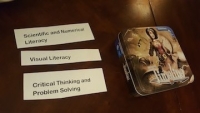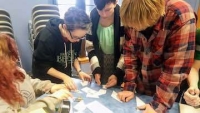Teens, Tabletop Games & 21st Century Learning
Kansas City Public Library, Mo.
Innovation Synopsis
Four youth librarians believed in the possibility of tabletop gaming to achieve 21st century skills through informal learning. They immersed themselves in gameplay knowledge, debriefing techniques and facilitation skills. Average attendance at weekly programs grew from four to 14, with teens taking leadership in facilitating and debriefing.
Challenge/Opportunity
Many of our teen patrons struggle to find jobs and often do not have opportunities to develop job readiness skills. Tabletop Gaming provides an informal approach for youth to build these and other 21st century skills including collaboration and teamwork, creativity and imagination, problem solving, critical thinking, flexibility and communication. Training and utilizing teen volunteers as game facilitators adds significantly to the leadership experiences necessary for job readiness.
Key Elements of Innovation
Internally, the staff process of learning gameplay, discussing connections of games to 21st century skills, facilitating games and leading debriefing discussions prepares librarians to fully engage youth in reflecting on their actions. This youth reflection provides rich data for growing the tabletop gaming initiative to other staff and other branch locations. Externally, youth build job readiness skills many seize the opportunity to develop leadership skills in becoming an expert in gameplay and game facilitation.
Achieved Outcomes
The initial impact derived from this initiative makes a strong case that these programs promote job readiness skills in youth. Impact is seen in young people taking teaching and facilitating roles as well as their evaluation comments, including “I’ve now got a better understanding of how to talk to others without freaking out” and “I feel like I gained problem-solving skills from working with my team because I saw their perspectives on certain problems.”



